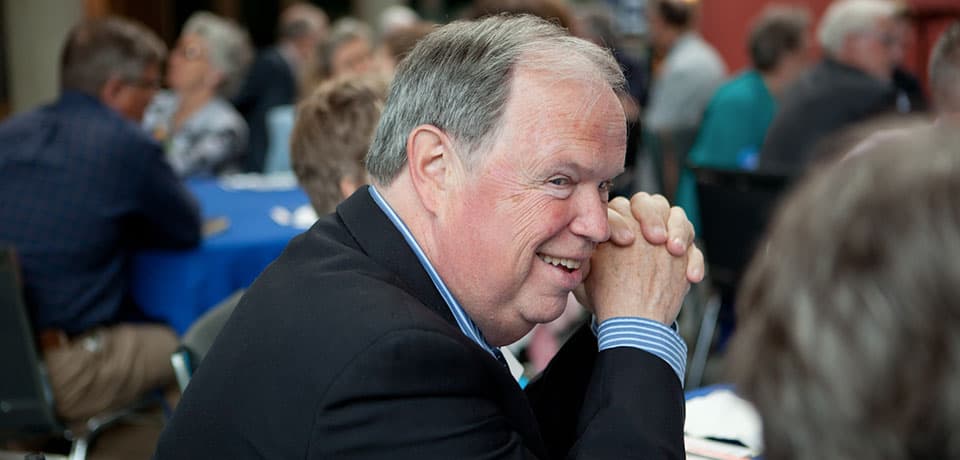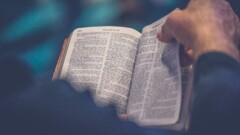Last week brought the news that Don Lewis has died—Dr. Donald Munro Lewis, professor of church history at Regent College in Vancouver, British Columbia. He is remembered there with great affection not only as a skilled teacher of church history, but as a spiritual companion to many, a faithful mentor, and a man who was committed to prayer. And though I met Don only a handful of times, and though we were only infrequent correspondents, I owe him pretty much everything.
Long before Don was a professor at Regent, or even a student there, he attended Bishop’s University in Lennoxville, Quebec, very close to his hometown of Sherbrooke. Don was raised in a Christian home and became a believer at a young age. His father led a church in the Pentecostal Assemblies of Canada and it was as a Pentecostal that Don enrolled at Bishop’s University, a school associated with Anglicanism. Bishop’s is set in the beautiful Eastern Townships of Quebec, quite near to Montreal where my father was raised and closer still to the small towns where my mother grew up. It was on the campus of Bishop’s that these three lives would intersect.
Dad had grown up in a privileged home, the son of a Superior Court Justice. But his family life had been turbulent, often dominated and disrupted by a sister who suffered from severe mental illness and who committed suicide when dad was in his teens. (Nancy’s story, as I have explained elsewhere, became the subject of Leonard Cohen’s song “Seems So Long Ago, Nancy”.) Unusually intelligent and always interested in ideas, dad enrolled in Bishop’s to study philosophy. But though he understood philosophy, he couldn’t make himself believe in philosophy. He didn’t buy it as the ultimate explanation for his ultimate questions. His heart remained restless. Angry even. Despairing.
In the final year of dad’s undergraduate studies, he and Don Lewis became fast friends. They were soon spending hours together discussing life, faith, God, and everything in between. As they talked, Don found opportunities to explain the gospel of grace and to call dad to it. And eventually dad realized he had finally found ideas that were big enough to fill his mind and great enough to satisfy his heart. Here’s how Don explained it in the eulogy he delivered at my father’s funeral:
Slowly his questions were heard, his raging against life and God was stilled. After about six months John had found his way into the Kingdom of God. John Wesley said of the people in a small town in Cornwall of the impact of his preaching: “the lions have become lambs.” Or as Puritan preachers might have said, “The roaring lion vanquished by the Lion of the tribe of Judah.” Vanquished, but not that John ever lost his passion, or his asking of deep questions.
In the same eulogy Don said that his friendship with dad “was one of the great gifts that has shaped my life.” I know dad would have said just the same.
Meanwhile, mom had also become a student at Bishop’s and, though she succeeded academically, found herself doing poorly otherwise. She had determined that life was meaningless, that she could never find hope and joy, that there was no solution to the guilt she felt or to the knowledge of the evil that dwelt within her. She had determined she would give herself a few more days and, if in that time she could not find a reason to live, would simply take her own life and be done with it. Sitting alone on campus one day, dad came bounding up to her. They had met a couple of times and had even gone on one date, and she knew him just well enough to know that something about him was different. In his zeal, dad began to tell her all about his newfound faith. He begged her to go out to dinner with him two days later so he could tell her more about it. She went, though almost against her will. On that very evening she, too, came to faith after dad led her to some Christians Don had introduced him to.
Mom and dad were married just a few months later. With university now behind them they decided to travel through Europe and, for whatever reason, Don journeyed with them. But real life beckoned and it was not long before their ways parted. Don decided to pursue further education and studied first at Regent, then at Oxford. He became a committed Anglican along the way and, alongside his friend and colleague J.I. Packer, devoted much of his life to fostering a healthy Anglicanism. Meanwhile, mom and dad had spent time with Francis Schaeffer and his family and become committed Presbyterians. But though their ways and Don’s parted and they settled on opposite sides of a very large country, they stayed in touch, even if only sporadically. Regent’s remembrance of Don says: “Prior to Covid-19, it was not unusual for Don to spend his reading week flying from Atlanta to Minneapolis to Winnipeg to visit the many alumni and pastors he mentored.” He made many of these Pauline missionary journeys and a number of them led to our home and to my parents—his way of continuing to invest in the people he had led to Jesus.
Mom and dad had five children, and all of us know the Lord. We have 16 children between us, and they all know the Lord—at least, those who are old enough to be able to express it. But there’s more. Dad told his mom about Jesus and she believed. He told his older sister and she, too, believed. Mom told her sister and she believed. And those families, too, now boast three generations of believers. And if we trace the Christian faith of all these people—perhaps 40 or 50 of us now—they all eventually converge on Don Lewis. They all converge on a young man who simply and faithfully shared the gospel.
Jesus told a parable about a farmer who went into his fields to sow seed. He scattered it far and wide. Some fell along the path where it was quickly gobbled up by birds; some fell on rocky soil where it sprang up but, because its roots had no depth, was scorched by the sun; some fell among weeds where it was choked out by thorns; but some fell onto good soil where it put down deep roots, grew well, and produced a crop that was 30 or 60 or 100 times more plentiful than itself. And this is exactly how the Lord does his work, through ordinary people like Don when they share the extraordinarily Good News of the gospel. Don told dad; dad told mom; they told me; I told Aileen; we told our children; they will tell theirs. And so it will go until the full harvest is gathered in, until the Lord returns, until we are all reunited before Him.
As friends and family gather to remember Don, to lament his departure but rejoice in his homegoing, I find myself praising God for his life and legacy, for in a small way I am part of that legacy—that legacy of faithfulness to the Lord Jesus Christ. “In some ways I consider you my spiritual grandson,” he once wrote me, “as I was, under God, someone who had a significant role in your father’s coming to faith.” And in just that way, under the kind providence of God, I owe everything to Don Lewis.











